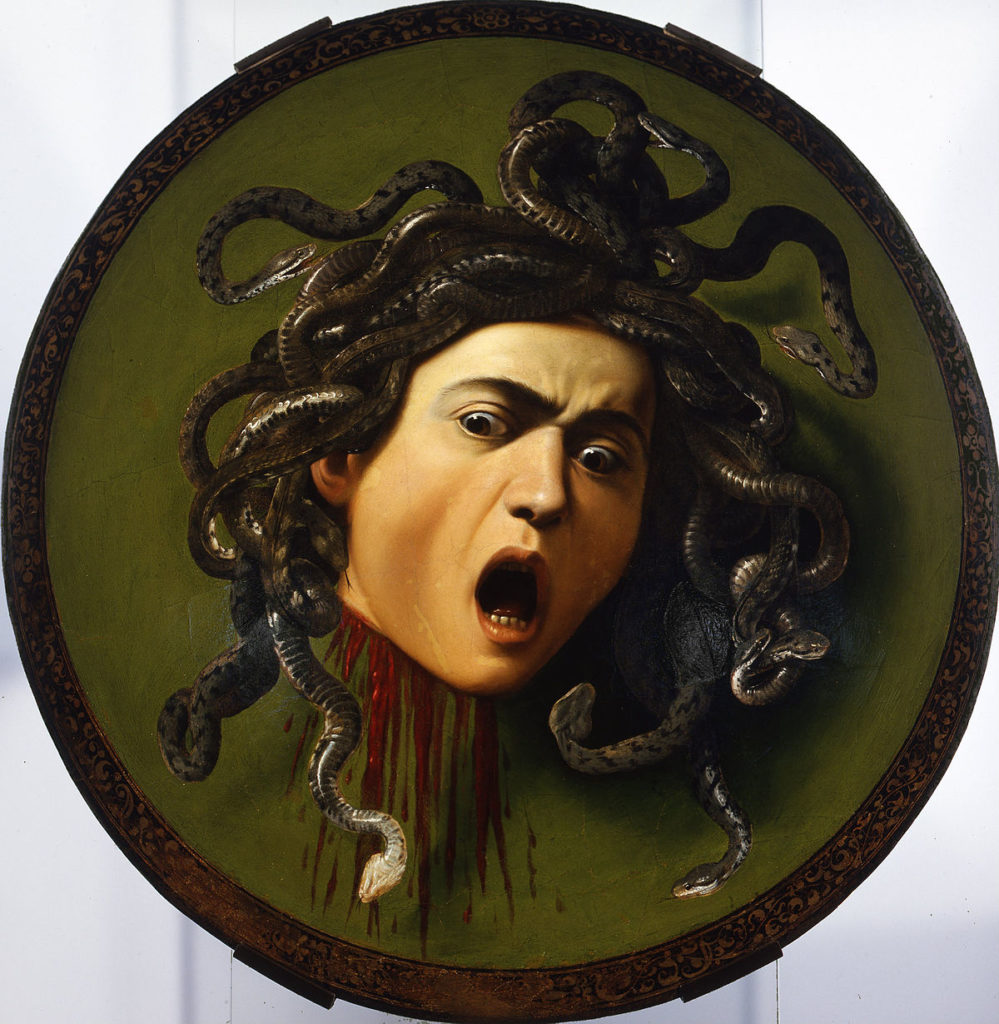[Greek] τέρας (teras), [Latin] stupendus: wonder, monster, portent, prodigy, threat, sign, power; Mt. 24:24, Mk.13:22, Acts.2:19,22,43, Acts 4:30, Acts 5:12, Acts 6:8, Acts 7:36, Acts 14:3, Acts 15:12, Rom.15:19, 2Cor.12:12, 2Thess. 2:9, Heb.2:4

The Gorgan Medusa depicted by Michaelangelo Caravaggio in 1596
Background Information:
Greek Hellenistic views toward omens: Since pre-Homeric times, this term has been associated with natural phenomena. Homer, connecting omens with gods, calls Zeus the divine author of omens. These phenomena (signs) occur to enable man to receive insight or understanding from the gods. Rather than a cause for fear, these omens (and higher powers) can be viewed in a rational way. Over time, however, this phenomena is viewed more as superstitions as viewed from historians, politicians, and philosophers.
Example of omens: Homer’s Illiad 5.74 makes mention of “the dread monster, the Gorgon dread and awful, a portent of Zeus.” Homer’s Odyssey 20, 101-104 states, “Zeus the counselor heard him. Straightway he thundered from gleaming Olypmus, from on high from out the clouds.” Sophocles’ Trachiniae makes reference of “the invincible three headed hellhound from Hades.” Euripides’ Phoenissae makes mention of “the Sphinx, that winged monster from the hills.” Isocrates’ Orations 27 makes mention of “the Minotaur, half man and half bull.” Plato Cratylus 394D states, “And how about those who are born contrary to nature as prodigies? For instance when an impious son is born to a good and pious man.”
Old Testament: This term, related to 4 Hebrew terms, occurs over fifty times in the Old Testament. These terms generally relate to an event or factor outside the realm of the ordinary which demands attention. However, rather than the event itself, the focus is on the content of God’s revelation. This message relates to God as the Creator and Lord, rather from the sphere of the mysterious and unnatural. This term is rarely used in Greek Judaism. The meaning and use of this term differs from its secular use.
O terrible in renown, worker of wonders (Exo.15:11). Come and see the works of the Lord, who has done fearsome deeds on earth (Psa.45:9). He prayed to the Lord, who answered him by giving him a sign (2Chr.32:24). Recall the wondrous deeds He has done (Psa.105:5). On your return to Egypt, see that you perform before Pharaoh all the wonders I have put in your power (Exo.4:21). Over this crossed the whole nation sheltered your hand, after they beheld stupendous wonders (Wis.19:8).
New Testament: This term essentially means wonder, portent, and miracle. In the non-Jewish Greek culture, this term took on great significance as an omen from the gods. However, in Greek Judaism, this term primarily took on the Jewish understanding of the revelation of God as Lord and Creator. Later, in the New Testament culture, this term refers to false prophets, signs, and miracles in a general sense. This refers to the wonders and signs of Stephen before his death. This term, always associated with wonders and portents, is separate (and different) from Jesus’ miracles and signs. The Greek term semeion (sign) applies to Jesus’ miracles.
Scripture:
“Now Stephen, filled with grace and power, was working great wonders and signs among the people.” Acts 6:8
Stephen performed these wonders and signs with the help of the Holy Spirit.
“False messiahs and false prophets will arise and will perform signs and wonders in order to mislead, if that were possible, the elect.” Mk.13:22
Jesus speaks of the coming signs of the Great Tribulation
“The signs of an apostle were performed among you with all endurance, signs, wonders, and mighty deeds.” 2Cor12:12
Jesus’ ministry is accompanied demonstrations of power. This is a visible proof of belonging to Christ.
Conclusion:
Terror, terrible, terrific, stupendous
This term has historically been associated with natural and supernatural phenomena. In their attempts to understand this phenomena, the ancient Greeks attributed these signs to the gods. These signs and portents provided man with insight and revelation in how to live their lives. Rather than through fear, man viewed this phenomena in a rational way. These portents were the means by which the gods communicated with man.
Something terrible causes terror, awe, or dread. This meaning of very bad or awful was first coined in the 1590’s. Something terrific causes terror or fear. Terrific in the sense of terrific headache was first coined in 1809. Terrific in the sense of excellent was first coined in 1888. Something stupendous causes someone to be astonished, stupefied, or stunned.
You have to admit the ancient Greeks were not stupid. Although they did not have a full understanding of this natural phenomena, they managed to rationalize that these signs and omens came from the gods. If you don’t know where it comes from, just say, “The gods are calling us.” Not quite a stupendous answer. But also not exactly right.
Update: One can also say that some people have recently been doing very terrible, frightening, and stupid things with social media. It is very scary!
